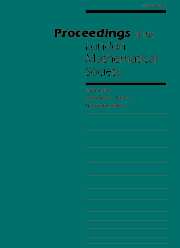Crossref Citations
This article has been cited by the following publications. This list is generated based on data provided by
Crossref.
Brennan, Joseph
and
Vasconcelos, Wolmer V.
2004.
Effective normality criteria for algebras of linear type.
Journal of Algebra,
Vol. 273,
Issue. 2,
p.
640.
Eisenbud, David
Huneke, Craig
and
Ulrich, Bernd
2004.
Order ideals and a generalized Krull height theorem.
Mathematische Annalen,
Vol. 330,
Issue. 3,
p.
417.
Simis, Aron
2004.
Cremona transformations and some related algebras.
Journal of Algebra,
Vol. 280,
Issue. 1,
p.
162.
Hong, Jooyoun
Ulrich, Bernd
and
Vasconcelos, Wolmer V.
2006.
Normalization of modules.
Journal of Algebra,
Vol. 303,
Issue. 1,
p.
133.
Branco Correia, Ana L.
and
Zarzuela, Santiago
2006.
On the asymptotic properties of the Rees powers of a module.
Journal of Pure and Applied Algebra,
Vol. 207,
Issue. 2,
p.
373.
Naghipour, R.
and
Schenzel, P.
2007.
Asymptotic Behavior of Integral Closures in Modules.
Algebra Colloquium,
Vol. 14,
Issue. 03,
p.
505.
Katz, Daniel
and
Rice, Glenn
2008.
Asymptotic prime divisors of torsion-free symmetric powers of modules.
Journal of Algebra,
Vol. 319,
Issue. 5,
p.
2209.
Jean Chan, C.-Y.
Liu, Jung-Chen
and
Ulrich, Bernd
2008.
Buchsbaum–Rim multiplicities as Hilbert–Samuel multiplicities.
Journal of Algebra,
Vol. 319,
Issue. 11,
p.
4413.
Ciliberto, Ciro
Russo, Francesco
and
Simis, Aron
2008.
Homaloidal hypersurfaces and hypersurfaces with vanishing Hessian.
Advances in Mathematics,
Vol. 218,
Issue. 6,
p.
1759.
Hayasaka, Futoshi
and
Hyry, Eero
2008.
A Family of Graded Modules Associated to a Module.
Communications in Algebra,
Vol. 36,
Issue. 11,
p.
4201.
Branco Correia, Ana L.
and
Zarzuela, Santiago
2009.
On Equimultiple Modules.
Communications in Algebra,
Vol. 37,
Issue. 6,
p.
1949.
Marcelo, Agustín
Muñoz Masqué, J.
and
Rodríguez Mielgo, C.
2010.
Local Cohomology with Supports in the Non-free Locus.
Algebra Colloquium,
Vol. 17,
Issue. 03,
p.
425.
Branco Correia, Ana L.
and
Zarzuela, Santiago
2010.
On the depth of the Rees algebra of an ideal module.
Journal of Algebra,
Vol. 323,
Issue. 5,
p.
1503.
Miranda Neto, Cleto B.
2011.
Vector fields and a family of linear type modules related to free divisors.
Journal of Pure and Applied Algebra,
Vol. 215,
Issue. 11,
p.
2652.
Doria, A.V.
Hassanzadeh, S.H.
and
Simis, A.
2012.
A characteristic-free criterion of birationality.
Advances in Mathematics,
Vol. 230,
Issue. 1,
p.
390.
Branco Correia, Ana L.
and
Zarzuela, Santiago
2013.
Divisors of a module and blow up.
Journal of Pure and Applied Algebra,
Vol. 217,
Issue. 9,
p.
1773.
Singh, Priti
and
Kumar, Shiv Datt
2014.
Reduction in Rees Algebra of Modules.
Algebras and Representation Theory,
Vol. 17,
Issue. 6,
p.
1785.
Lin, Kuei-Nuan
and
Polini, Claudia
2014.
Rees algebras of truncations of complete intersections.
Journal of Algebra,
Vol. 410,
Issue. ,
p.
36.
Hong, Jooyoun
and
Ulrich, Bernd
2014.
Specialization and integral closure.
Journal of the London Mathematical Society,
Vol. 90,
Issue. 3,
p.
861.
Fukumuro, Kosuke
Kume, Hirofumi
and
Nishida, Koji
2015.
On Modules of Linear Type.
Acta Mathematica Vietnamica,
Vol. 40,
Issue. 1,
p.
101.




